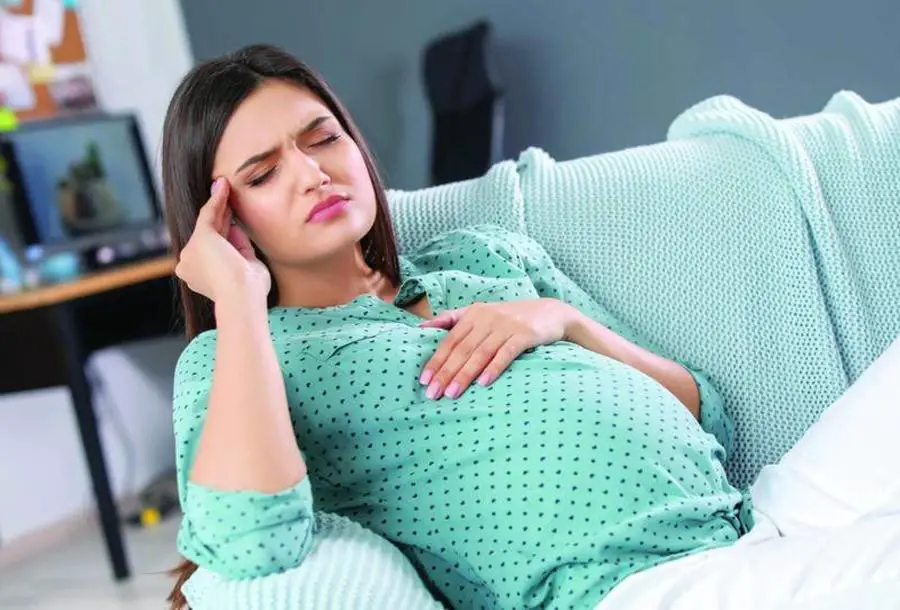Headaches in pregnant women and fetal gender
There is a common belief that headaches during the early stages of pregnancy are considered evidence of the gender of the fetus.
Rumor has it that if a woman suffers from severe headaches in the front of her head, the fetus will be a boy.
However, recent studies have revealed that these beliefs are incorrect.
The relationship between pregnancy headaches and the gender of the fetus has not been scientifically proven.
It does not negatively affect the newborn, unless serious symptoms appear in the mother’s body.
The appearance of pregnancy headaches is due to hormonal changes that occur in a woman's body during pregnancy.
Some people may believe that severe pregnancy headaches reveal the gender of the fetus, but there is no scientific evidence to support this claim.
There are some rumors circulating that severe headaches indicate the pregnancy of a boy.
Some people may think that a woman pregnant with a boy suffers from headaches commonly during pregnancy.
But these concepts are baseless.
| Common saying | Scientific truth |
|---|---|
| Severe pregnancy headaches are evidence that you are pregnant with a boy. | There is no scientific evidence to support this statement. |
| Pregnant with a boy suffers from headaches a lot. | There is no scientific evidence to support this statement. |
| Pregnancy headaches do not negatively affect the newborn. | True, unless other serious symptoms appear. |
| Pregnancy headaches are caused by hormonal changes in a woman's body. | True, but it is not a clear indicator of the gender of the fetus. |

What are the types of headaches for pregnant women?
- Migraine: This is a common type of headache that occurs more often on one side of the head.
The pain can be moderate or very severe.
Many pregnant people suffer from migraines during pregnancy. - Tension headache: This is another common type of headache that accompanies pregnant women.
Tension headaches are usually caused by muscle tension and psychological tension.
The pain can be moderate to constant in tension headaches. - Cluster headache: It is a rare type of headache that may occur during pregnancy.
Cluster headaches are characterized by sharp, severe pain in one area of the head, which can last a long time and be accompanied by a stuffy nose and eye problems.
Although the above types are common types of headaches, the specific cause of a pregnant woman's headache must be determined.
Headaches can sometimes be a sign of another health problem, such as blood vessel disorders or preeclampsia.
To treat headaches in pregnant women, pregnant women can take safe pain relievers such as acetaminophen (Tylenol) and other medications recommended by the health care provider depending on the condition.
It is worth noting that a doctor should be consulted before taking any medications, especially for pregnant women.
Your doctor may recommend other preventive measures to reduce the severity of headaches and relieve bothersome symptoms.
When does pregnancy headache start and when does it end?
The pregnancy period witnesses many changes and transformations that occur in a woman’s body, including the phenomenon of pregnancy headaches.
Many women who are expecting a baby suffer from this common headache, especially during the first months of pregnancy and the third trimester.
The first attacks of pregnancy headaches can increase during the second month of pregnancy.
Headaches are a natural phenomenon that may be annoying for pregnant women.
Headaches should start in the first trimester and gradually end in the following months.
However, pregnant women should pay attention to some signs that may accompany headaches, such as severe migraines, which are considered the most common among pregnant women, especially in the first months of pregnancy.
Headaches can return again during the fourth, fifth, and sixth months as a result of stress and the increase in the size of the uterus, which puts pressure on the nerves and blood vessels and causes a feeling of fatigue.
The timing of the occurrence of pregnancy headaches is determined by the process of implantation of the fertilized egg in the wall of the uterus, which is accompanied by the release of pregnancy hormones. Usually, the headache begins from the day of egg implantation and continues until the fourth or fifth month of pregnancy, when it begins to subside.
The cessation of headaches or a decrease in their intensity by the second and third months of pregnancy indicates an improvement in their general condition.

What does a headache in pregnant women indicate?
Headaches are one of the common problems that women face during pregnancy.
Many women suffer from headaches due to the hormonal changes that occur in their bodies during this period.
Usually, headaches increase in the first months of pregnancy due to an increase in pregnancy hormone, which affects the blood vessels in the brain.
To deal with headaches during pregnancy, there are different methods that can be followed.
Pregnant women can control or treat headaches using drug treatments such as painkillers such as paracetamol.
However, pregnant women should be sure to consult a doctor before taking any medication to ensure its safety during pregnancy.
In addition to drug treatments, pregnant women can take care of a healthy lifestyle to alleviate headaches.
Important suggestions are to make sure you get enough sleep and avoid excessive stress.
You can also maintain a good blood sugar balance by eating healthy, balanced meals.
The necessity of practicing physical activity on a regular basis and in accordance with medical guidance should not be ignored.
Pregnant women should not underestimate and ignore headaches, as headaches may be evidence of other things that may affect the health of the mother and fetus.
Some other causes of headaches may include lack of sleep, high blood pressure, and anemia.
It is important to monitor and track any changes in health status and consult a doctor if headaches continue to be bothersome.
Are constant headaches dangerous for pregnant women?
Many women suffer from headaches during pregnancy, and although benign headaches such as migraines, tension headaches, and cluster headaches are common, they can also be a sign of another disease that may be more serious.
Hormones are affected during pregnancy, making women vulnerable to hormonal disorders and thus to headaches.
Headaches increase in the first months of pregnancy due to sudden changes in hormones.
But headaches usually improve or disappear completely in the first six months.
The frequency of headaches increases during the ninth weeks of pregnancy, as a result of the increase in blood volume and hormones in the pregnant woman’s body.
However, headaches can start at any time during pregnancy and may continue throughout the pregnancy.
In addition, headaches during pregnancy can be a sign of other health problems such as high blood pressure, vascular disease, and preeclampsia.
Therefore, if a pregnant woman suffers from persistent and recurring headaches that do not go away, it may be necessary to consult a doctor to ensure that there is no serious health condition.

Are headaches a symptom of low blood pressure in pregnant women?
Blood pressure is usually relatively low during pregnancy compared to normal values outside of pregnancy.
For example, normal blood pressure for the first level of pregnancy is about 120/80, while it is about 110/70 during pregnancy.
Low blood pressure below these values can cause a headache in the back of the head, which extends to the neck and is accompanied by a feeling of tingling and numbness in these areas.
Symptoms of shock include confusion, especially in older people, cold and sweaty skin, and discolouration of the lips.
Pregnancy headaches are considered one of the most common problems during the first and third trimesters of pregnancy, and may indicate a case of preeclampsia.
Therefore, close attention should be paid if these symptoms appear.
In general, medications to treat low blood pressure during pregnancy are not usually recommended unless the symptoms are serious or there are risks related to the pregnancy.
In the first weeks of pregnancy, it is normal for blood pressure to decrease, and it can be boosted by consuming adequate amounts of salt and fluids.
Does iron deficiency cause headaches and nausea in pregnant women?
Studies have shown that iron deficiency during pregnancy can lead to some uncomfortable symptoms, such as headaches and nausea.
Iron deficiency occurs when there is a low level of iron in the blood, which affects the body's ability to form red blood cells responsible for transporting oxygen to organs and tissues.
When pregnant, women need additional amounts of iron to support the growth of the fetus and the development of pregnancy.
If iron needs are not met, iron deficiency and anemia may occur.
One of the symptoms of iron deficiency anemia is headache.
Pregnant women with anemia often suffer from headaches in the frontal area of the head.
In addition, women may feel nausea and vomiting.
If you experience headaches and nausea during pregnancy, it may be helpful to talk to your doctor to get an iron check and make sure you have enough of it.
The doctor may prescribe iron supplements to compensate for any iron deficiency.
What is the treatment for headaches for pregnant women at home?
Headaches are a common problem that many people suffer from, and this problem increases during pregnancy.
Although there are several types of headaches, migraines are one of the most prominent and have the most impact on pregnant women.
Many pregnant women suffer from pregnancy headaches as a result of hormonal changes, psychological stress, tension in the neck and shoulders, malnutrition, and fluid deficiency.
Therefore, pregnant women can follow some simple procedures at home to alleviate headaches and relieve pain.
Among the most prominent home methods for treating headaches for pregnant women:
- Take zip when you feel a headache.
- Eat foods that contain magnesium, such as seeds and nuts.
- Apply a cold or warm compress to the forehead area for 10 minutes.
- Relax in a dark room and practice deep breathing.
- Take a warm bath and enjoy plenty of rest and relaxation.
- Drink plenty of fluids to prevent dehydration.
- Take acetaminophen (Tylenol) safely, as directed by your doctor.
- Get an extra half hour of sleep to relieve headache symptoms.
Although home treatment can be effective in relieving headaches in pregnant women, it is necessary to consult a doctor before taking any medication or treatment.
Pregnant women should be aware that there are some medications that should be avoided to avoid negative effects on the fetus.
What foods are prohibited for pregnant women?
- Uncooked meat: It is recommended not to eat raw or insufficiently cooked meat, as it may contain Listeria bacteria, which can affect the fetus through the placenta, causing miscarriage or stillbirth.
- Fish: You should avoid eating raw fish, such as uncooked fish and shellfish, as they may contain bacteria, viruses, or parasites that cause health problems for the fetus.
You should also avoid eating seafood containing mercury, as it can cause delayed brain development and damage. - Unpasteurized dairy products: It is recommended not to eat unpasteurized dairy products such as cheese and yogurt, as well as raw eggs, as they may contain bacteria that cause food poisoning.
- Undercooked meat and fish: You should avoid eating meat and fish that have not been cooked adequately, such as medium-rare or medium-rare steaks, sushi, and sashimi, as they can contain bacteria that may affect the health of the fetus.
Are headaches in the third month a sign of pregnancy with a boy?
Signs of pregnancy vary among women and differ from one case to another.
One of the signs that women may experience during pregnancy is headaches.
Women experience headaches commonly during pregnancy, especially in the first months.
Despite this, there is no direct relationship between headaches and the sex of the fetus.
Some may believe that a severe headache in the front of the head indicates a male pregnancy, while a mild headache indicates a female pregnancy, but this claim is not scientifically supported and does not have a strong basis of evidence.
The increase in the incidence of headaches during pregnancy is associated with a higher level of estrogen.
Some experts believe that this increase causes irritation of the blood vessels in the brain and thus causes headaches.
To relieve headaches during pregnancy, some preventive measures can be followed, such as lying on one side and staying away from potential causes of headaches, such as stress, tension, bright light, and loud sounds.
It is also recommended to drink enough water and get enough rest and sleep.
What are the very early signs of pregnancy?
- Delayed menstruation: Delayed menstruation is one of the most prominent signs of very early pregnancy.
Failure to have a period on the expected date is usually a sign of possible pregnancy. - Increased basal body temperature: In addition to delayed menstruation, increased basal body temperature can also indicate a possible pregnancy.
Women can measure their body temperature with a puzzle thermometer. - Pain when touching or soreness of the breast: Some women can feel mild pain or tenderness in the breasts during the early period of pregnancy.
- Vaginal bleeding: Limited vaginal bleeding or “spotting” is a common sign of very early pregnancy.
Light bleeding may occur in the vagina as a result of the intrusion of blood from the uterus, and this is considered an indication of pregnancy. - Exhaustion and fatigue: Exhaustion and fatigue are early symptoms of pregnancy.
A woman may feel extremely tired and exhausted even after making a little effort.
This may happen due to hormonal changes and high metabolism in her body. - Changes in food cravings: Prospective women may experience different food cravings themselves or may feel cravings for specific types of food.
- Increase in the size and sensitivity of the breasts: Women may feel their breasts increase in size and become more sensitive during early pregnancy.
| Signs of very early pregnancy | Explanation |
|---|---|
| Delayed menstruation | The period does not occur on the expected date |
| Increased core body temperature | An increase in core body temperature |
| Pain when touching or soreness of the breast | Feeling mild pain or sensitivity in the breasts |
| vaginal bleeding | Mild vaginal bleeding |
| Fatigue and tiredness | Feeling exhausted and overly tired |
| Changes in food cravings | Changes in perceived desire for food |
| Increase in the size and sensitivity of the breasts | Increased breast size and increased sensitivity to them |
Is the desire to sleep a symptom of pregnancy?
Not feeling sleepy is something that many women have in common during pregnancy.
Excessive sleep is an early pregnancy symptom that many women experience.
High levels of progesterone - the pregnancy hormone - may cause a constant feeling of fatigue and exhaustion.
High progesterone level is a major cause of excess sleep in pregnant women.
During the first weeks of pregnancy, women may have difficulty waking up, and constantly feel tired and exhausted.
During this period, the number of hours the body needs to sleep increases, due to hormonal changes in the body.
Some may experience increased sleepiness and other symptoms such as nausea, vomiting, and breast tenderness.
In addition, some women may experience odor sensitivity and food aversions, or feel intense desires to eat.
This is part of the body changes that occur during pregnancy.
However, prospective mothers may wonder whether excessive maternal sleep affects the fetus.
According to experts, there is no scientific evidence to prove that excessive maternal sleep negatively affects the fetus.
However, mothers with chronic symptoms or excessive anxiety should go to their doctor to seek advice and ensure their health condition and the health of the fetus.
